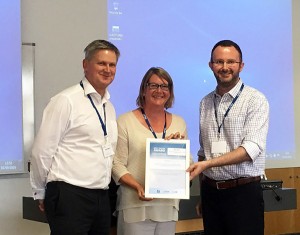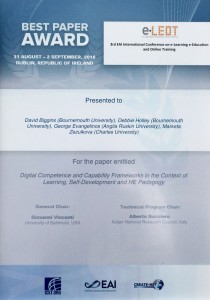A six nation collaborative EU bid, led by BU’s Sarah Hean and including Carol Bond, Jaqui Hewitt-Taylor, Sara Ashencaen Crabtree and Jonathan Parker has been successful in securing funding for a four-year project exploring meaningful, appropriate and effective ways of assisting the rehabilitation of people in prison with mental health problem. Sarah is currently completing her highly successful and prestigious Marie Curie-Sklodowska fellowship at the University of Stavangar, Norway, returning to BU in January 2017.
Reoffending is a problem in Europe and internationally. Offender rehabilitation strategies to reduce reoffending focus on limiting key risk factors (e.g. unemployment, substance misuse) which are so often mediated by the individual’s mental health. Levels of mental health are much higher in the prison population, which therefore limits the effectiveness of rehabilitation strategies.
Professionals in mental health and prison services constantly need to find new solutions to the bespoke needs of each individual offender with a mental health issue. Leaders in these services need to transform current working practices in a process of continuous quality improvement to keep up with the changing needs of the offender population, the development of new technologies and the changing landscape of service provision. However, people who have offended also need to take responsibility for their rehabilitation and play an active role in developing solutions to their own needs and challenges. In other words front line professionals, offenders and leaders need to be innovators.
This project therefore seeks collaborative and effective relational work and knowledge exchange between professionals from mental health, prison services and individual offenders. At present collaboration between prisons and mental health services is limited. New models of interagency working are required in which social innovation and collaboration processes are made explicit. In the fields of developmental work research, practice development and social innovation, there is a range of successful models of collaborative working and innovation that have had positive outcomes in other practice contexts. The methods include the ethnographic ‘change laboratory’ methods in development work research, the Ajkaer model of social innovation and collaboration based on a ‘diamond model’ of innovation already applied to working between prison officers and prisoners, Practice Development Units developed and extensively applied in the field of health and social care organizational change with a national reputation in the UK and competency based educational models focused on developing integration, collaboration and social innovation competences in the workforce. The academic members of the consortium have international reputations in the application of these models and will apply these to the rehabilitation of mentally ill offenders specifically and to the interagency working required between mental health services and prison services exploring which of these models might be most effective in transforming interagency working practices in offender rehabilitation or whether an amalgamation or hybrid model combining the strengths of these might be more appropriate.
 Public Health England has launched a
Public Health England has launched a  On Wednesday, 19th October 2016, BU’s Global Engagement team (as part of the new Research Knowledge Exchange Development Framework) will be facilitating a Sandpit event on Global Challenges, attended by staff from the DFID and other organisations.
On Wednesday, 19th October 2016, BU’s Global Engagement team (as part of the new Research Knowledge Exchange Development Framework) will be facilitating a Sandpit event on Global Challenges, attended by staff from the DFID and other organisations.







 Membership vacancies
Membership vacancies












 Expand Your Impact: Collaboration and Networking Workshops for Researchers
Expand Your Impact: Collaboration and Networking Workshops for Researchers Visiting Prof. Sujan Marahatta presenting at BU
Visiting Prof. Sujan Marahatta presenting at BU 3C Event: Research Culture, Community & Can you Guess Who? Thursday 26 March 1-2pm
3C Event: Research Culture, Community & Can you Guess Who? Thursday 26 March 1-2pm UKCGE Recognised Research Supervision Programme: Deadline Approaching
UKCGE Recognised Research Supervision Programme: Deadline Approaching ECR Funding Open Call: Research Culture & Community Grant – Apply now
ECR Funding Open Call: Research Culture & Community Grant – Apply now ECR Funding Open Call: Research Culture & Community Grant – Application Deadline Friday 12 December
ECR Funding Open Call: Research Culture & Community Grant – Application Deadline Friday 12 December MSCA Postdoctoral Fellowships 2025 Call
MSCA Postdoctoral Fellowships 2025 Call ERC Advanced Grant 2025 Webinar
ERC Advanced Grant 2025 Webinar Update on UKRO services
Update on UKRO services European research project exploring use of ‘virtual twins’ to better manage metabolic associated fatty liver disease
European research project exploring use of ‘virtual twins’ to better manage metabolic associated fatty liver disease